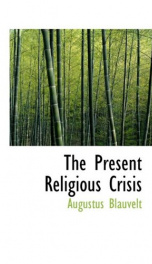the present religious crisis

Purchase of this book includes free trial access to www.million-books.com where you can read more than a million books for free. This is an OCR edition with typos. Excerpt from book: CHAPTER III. THE VALIDITY OF THE BIBLICAL CANON. We have already adverted to the traditional dispute between Protestants and Catholics as it concerns the canonical or uncanonical character of the apocryphal books of the Old Testament. Leaving these parties to share their individual opinions on that subject, we will now proceed to examine very briefly into the validity of some of the leading reasons which the Protestants in particular have been in the habit of advancing in support of the canon- icity of the several books composing the Protestant collection of the Holy Scriptures. The chief argument which the older Protestant divines present for the canonicity of the Old Testament books, which they accept in common with the Catholics, consists in the allegation that all these books, and none others, received the explicit sanction of Jesus and his apostles. But among modern Protestant biblicists this line of argument must have a very modified value. Thus Professor W. Robertson Smith affirms that neither the Book of Esther,nor that of Canticles, nor that of Ecclesiastes, is ever referred to in the New Testament.1 Moreover, Dr. Davidson frankly concedes that the New Testament writings betray a familiarity with the ideas and expressions of the apocryphal books, as James with those of Sirach, Hebrews with those of Second Maccabees, Romans with those of Wisdom, and Jude with those of Enoch.2 Regarded from this point of view, therefore, modern Protestant biblical scholars would be compelled to admit that at least three of the non-apocryphal books Esther, Canticles, and Ecclesiastesmust be excluded from the Old Testament canon, and that at least four of the apocryphal books Sirach, Second Maccabees, Wisdom, and Enochmust be included in such canon. Again : The exact prin... --This text refers to an alternate Paperback edition.
Info about the book
Author:
Series:
Unknown
ISBN:
1440062005
Rating:
3.5/5 (4)Your rating:
0/5
Languge:
English
Users who have this book
Users who want this book
What readers are saying
What do you think? Write your own comment on this book!
write a commentif you like the present religious crisis try:
Other books by this author
Do you want to read a book that interests you? It’s EASY!
Create an account and send a request for reading to other users on the Webpage of the book!

